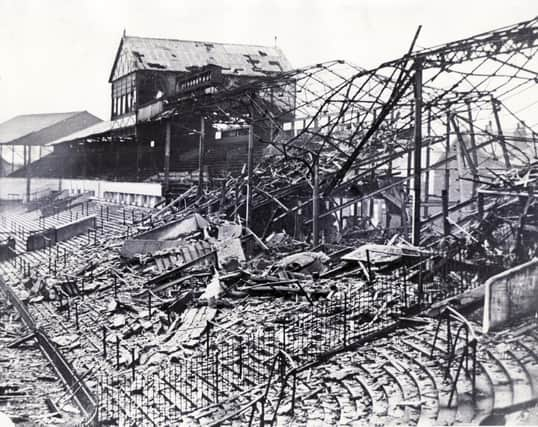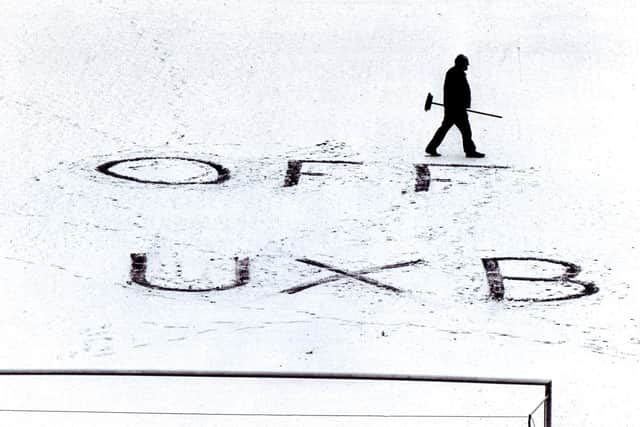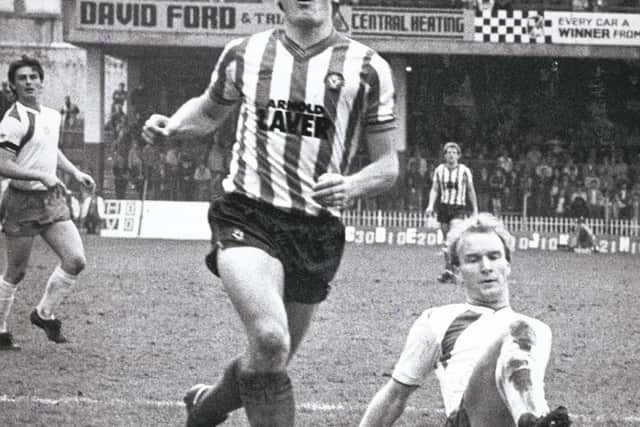The day bomb left over from the Blitz saw Sheffield United match postponed 45 years later


But the former Sheffield United centre-forward, who scored more than 140 league goals across his two spells at the club, does remember poring through the history books, searching for information about the blitz, after learning its Division Two fixture against Oldham Athletic was being postponed because an unexploded bomb had been unearthed near Bramall Lane.
“You get used to matches being called off for all sorts of reasons,” Edwards says, casting his mind back to the winter of 1985 when the discovery was made. “But that isn’t one of them.
Advertisement
Hide AdAdvertisement
Hide Ad“Some of the details are a little sketchy, I admit that. But you’re not going to forget being told you’re aren’t going to be playing because of something like that, are you.”


Events surrounding United’s game against Joe Royle’s side, which was eventually played three days later when the device had been made safe, have been chronicled in detail by writers, broadcasters and bloggers researching football’s bizarrest postponements.
Nearly a quarter-of-a-century later, an Italian Serie B match between Salernitana and Frossone was rescheduled for similar reasons.
Residents near the Stadio Arechi, located in the ancient Campanian city, were also evacuated following the discovery. But United are thought to be the only English team forced to rearrange a fixture in such circumstances.
Advertisement
Hide AdAdvertisement
Hide Ad“I’m interested in what happened and, being reminded of it now makes me want to find out more,” Edwards continues. “When you think of what people were going through back then, what it must have been like, it puts everything we’re going through now with Covid-19 into a bit of perspective doesn’t it.


"I know it’s been really tough for lots of people out there and tragic for some too. But I can’t even begin to imagine what that must have been like, having bombs dropping on you out of the sky.”
The bomb was discovered 24 hours before kick-off, on Friday 8 February, during excavations for a new housing development on Lancing Road; a terraced street which runs parallel to Shoreham Street and United’s famous Kop.
Soldiers from the 33rd Engineer Regiment, the Explosive Ordnance Division, were called out to diffuse what was initially thought to be a 500lb weapon. On closer inspection, it turned out to be 2200lb, meaning around 300 people were forced to leave their homes as disposal experts went about their work. The risk to life was so great, and the process so tricky, that United were ordered to put back their meeting with Oldham until the area was deemed safe. The whole process, made even more complicated by the snowy weather at the time, took around 36 hours.
Advertisement
Hide AdAdvertisement
Hide Ad“Back then, we were all probably so focused on the football that we didn’t stop and think about it as much as we should have done,” Edwards, who was on target against the visitors from Lancashire, says. “I’ll have just been annoyed about not having the chance to score, because that’s what I enjoyed doing more than anything.”
“I do remember wondering about the circumstances of the postponement before we eventually played them,” he adds, reflecting on what proved to be a comfortable 2-0 victory. “I probably spent the Saturday afternoon watching the racing on the television. But then you do stop and think, don’t you - you think about it being sat there all that time, under the ground, and thankfully it didn’t go off before it was found. You also think about what that night, those nights, must have been like for the people who experienced them. How terrible it must have been.
“The people who made the bomb safe obviously did a brilliant job and it’s not one I’d fancy doing. It does make you think that, as footballers even in our day and age, we didn’t have too bad did we.”
Why United’s ground was struck by the Luftwaffe remains a mystery, although rather than being deliberately targeted, its close proximity to the city centre meant it was probably collateral damage as the German planes pounded other nearby sites.
Advertisement
Hide AdAdvertisement
Hide AdAnd United weren't alone in having their footballing home obliterated.
Clubs across England were devastated by German strikes throughout the war - Sunderland, Birmingham City, Manchester United, Ipswich Town, Norwich City, Plymouth Argyle, Coventry City and Bristol City among others suffered damage to varying degrees, with London dockside clubs West Ham and Millwall suffering regular bombardments.
In Sheffield, more than 660 people lost their lives, 1500 were injured and around 40,000 made homeless as the city came under attack.
Campo Lane, Fitzalan Square and a number of residential suburbs were hit after the first red alert was sounded at 7pm on Sunday 12 December. Seventy-two hours later, several steelworks were struck although production continued.
Advertisement
Hide AdAdvertisement
Hide AdPictures of the damage at Bramall Lane reveal a huge crater in the John Street Stand, which had partially collapsed. A timber yard owned by Arnold Laver, United’s future benefactors and sponsors, was also hit with United staging their subsequent home game, during Football League North Regional League, against Sheffield Wednesday at Hillsborough.
It finished in a goalless draw, with Colin Collindridge, who passed away last year, among two United players to hit the woodwork. Alf Jeffries, who joined Basingstoke Town after the war, was the other. He died in 2004.
“I’ve seen the pictures of the blitz since and it really does bring it home to you, the devastation,” Edwards says. “It’s something, because of what people went through, that I think everyone should be aware of and find out what they can.”